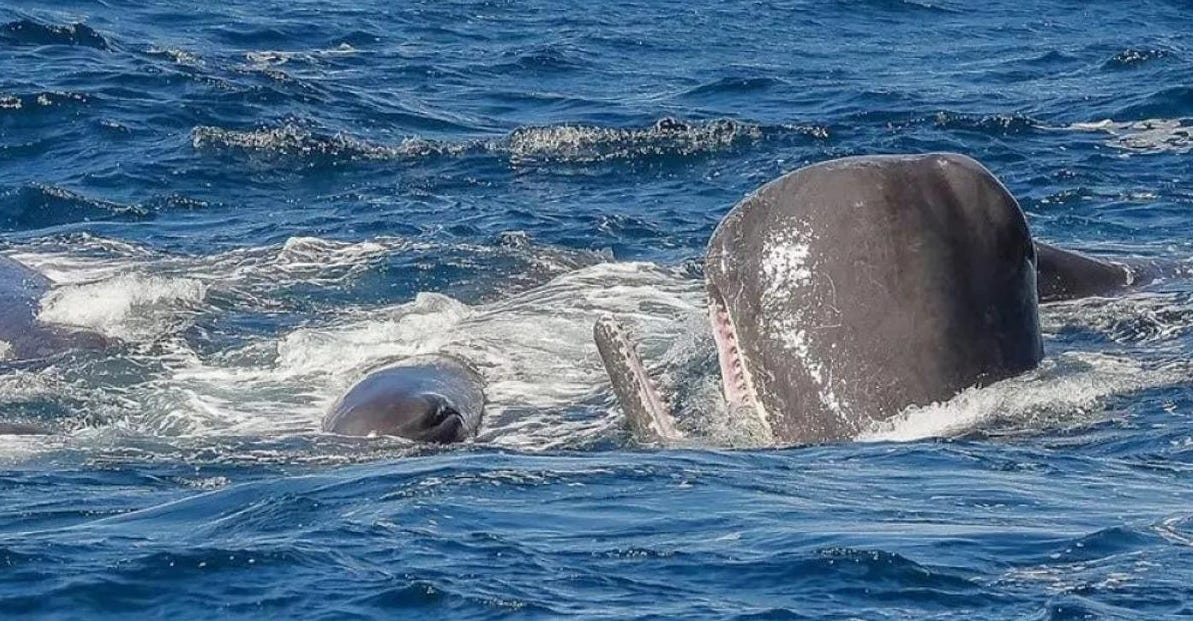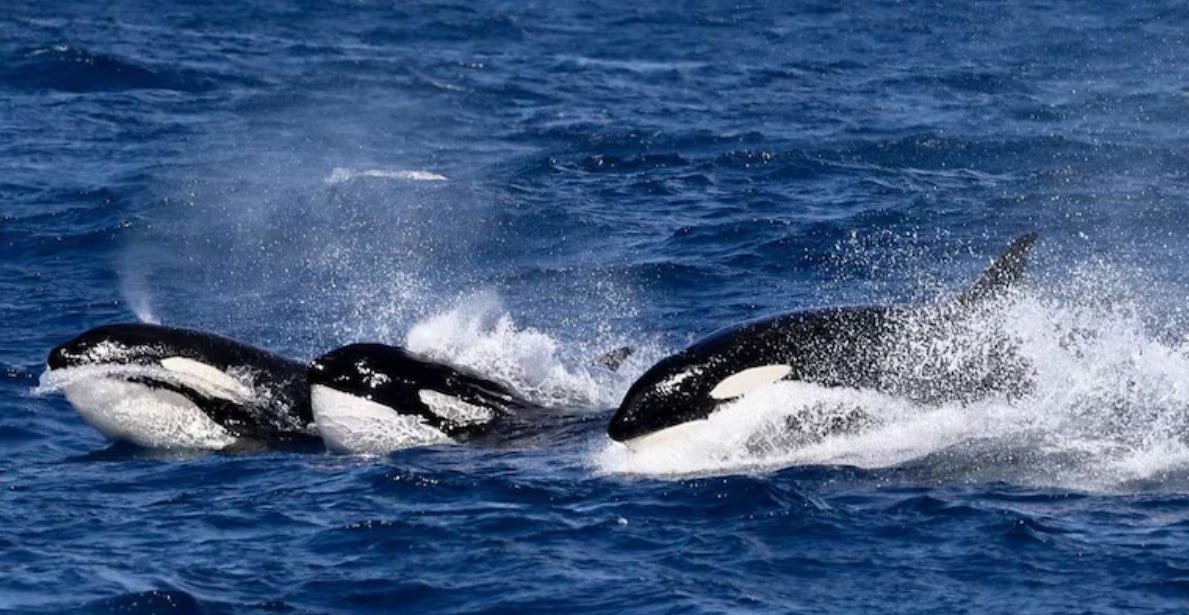Whale poo warfare
The brown battle you knew nothing about
Whale poo is a popular topic of discussion within marine conservation because of its incredible benefits to the ocean, and, ultimately, to the entire planet.
Many whales live on a diet of fish, squid, and other species found at significant depths. As they surface to breathe they also defecate, bringing essential nutrients like nitrogen and iron from the bottom to the top of the water column. And who just so happens to love nitrogen and iron? The mighty carbon-sequestering phytoplankton! This sequence of events is known as the ‘Whale Pump’ because nutrients are ‘pumped’ up and down, essentially keeping the marine-ecosystem-wheel turning.
Sperm whales are particularly adept at this as they’re the deepest of divers and so are extremely well versed in circulating nutrients. But never before have we considered another, messier benefit to sperm whale faeces. This time for their very own protection.
As an apex predator, attacks on sperm whales are extremely rare, but do occasionally happen. One such occasion arose recently when a group of orcas had a pop at a pod of the unfortunately named cetacean. It was witnessed by marine biologist, Jennah Tucker, who said: "It's actually pretty adventurous for orcas to try to take on sperm whales. They're punching above their weight."
A few weeks ago, off Western Australia’s southern coast, a group of sperm whales were attacked by a pod of at least 30 orcas. They were able to defend themselves with a strategy known as ‘defence defecation’. Essentially using their poop as a weapon.
Usually, larger whales have various strategies to protect themselves against attacks. They may form defensive circles with their tails facing outward, engage in powerful tail-slapping, or dive deep where predators cannot follow. Toothed whales can use their teeth for defence, but their primary tools are their massive tails and sheer size, which can both injure and intimidate attackers. Additionally, travelling in pods helps reduce the risk of predation, as there is safety in numbers.
However, when face to face with a pod of orca, immediately defecating is completely understandable too. Sperm whales aren’t easily scared, and are quite large even in comparison to Orca. They also possess one of the largest brains in the ocean, suggesting there is method behind the madness.
During the intense encounter witnessed by a tourist excursion, the sperm whales formed a tight, circular formation called a rosette, with their heads together and tails fanned out. They then proceeded to defecate, creating a “cloud of diarrhoea" in the water, swishing it around with their tails to confuse and disorient the orcas. The distinctive reddish colour of the sperm whales' faeces, a result of their squid-heavy diet, initially led scientists to believe the orcas had been successful in their attack as what they thought was blood filled the water around them. However, despite showing signs of distress and exhaustion the sperm whales method actually worked. Eventually, the orcas swam off in search of cleaner waters, leaving the sperm whales to recover from the ordeal.
This fascinating incident provides researchers with valuable insights into the hunting strategies of orcas and the self-defence mechanisms employed by whales. Whether the use of faeces as a defensive tool was an intentional act, a result of sheer panic, or a one time strategy remains to be determined. Yet one thing is certain: orcas may not shy away from much, but falling victim to a poo attack is a surefire way to lose your appetite. For now, it's Sperm Whales: 1; Orca: 0.
Here at Beached we are building a community that can put our brains and resources together to highlight and fund solutions to the problems facing sperm whales, orcas, and the oceans they live in. I hope you’ll join our humble community and click subscribe for free or support our work by purchasing the paid subscription.
All Beached posts are free to read but if you can we ask you to support our work through a paid subscription. These directly support the work of Beached and allow us to engage in more conversations with experts in the field of marine conservation and spend more time researching a wider breadth of topics for the newsletters. Paid subscriptions allow us to dedicate more time and effort to creating a community and provide the space for stakeholders to come together, stay abreast of each other’s work and foster improved collaboration and coordination.
One day Beached hope to donate a large percentage of the revenue from paid subscriptions to marine conservation organisations and charities to support their work too. Working together, we can reverse the degradation of our oceans.
Amie 🐋





Sequence of battle as follows:
Orca units sighted SW units and moved to attack.
SW units gathered in a circle and emptied their waste tanks, launching poopedoes at the Orcas.
After getting fouled by the poopedoes, the orca units turned and performed a leisurely escape and evade.
This is fascinating. What an amazing thing for the tourist boats to have witnessed.
I was fortunate to witness an orca birthing pod once from an empty beach in New Zealand. I had no idea what was happening at the time. It was only later when I described it to someone that they explained what I had seen. A group of orcas came within 5 metres of the beach forming a tight circle while two others patrolled back and forth between the headlands. They were there quite some time and it was so beautiful and peaceful. My only regret is that I didn't know to look for a baby at the time and didn't see it.